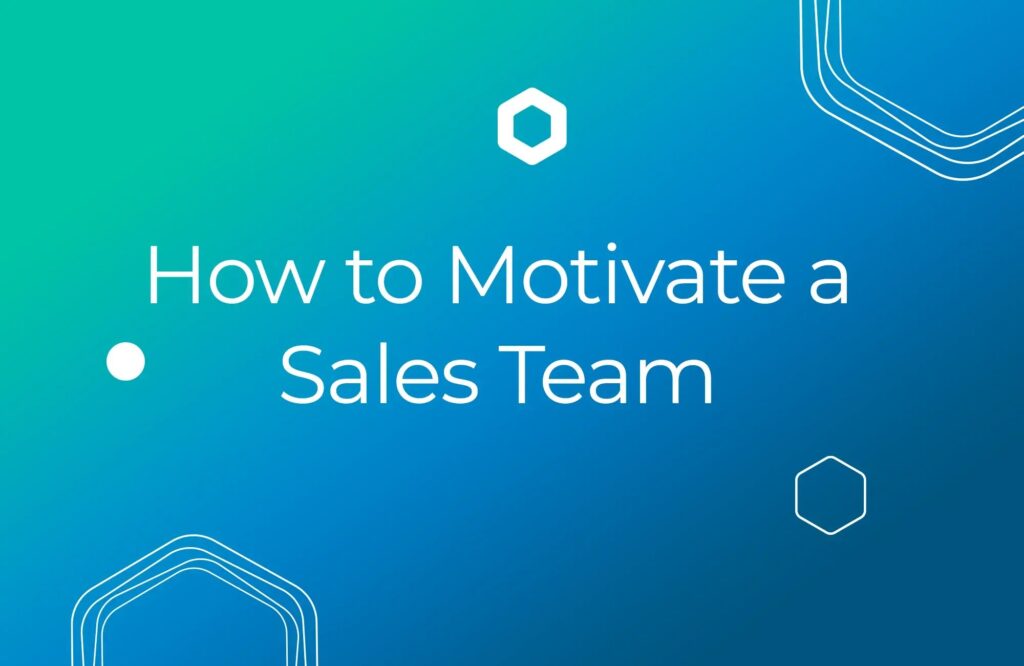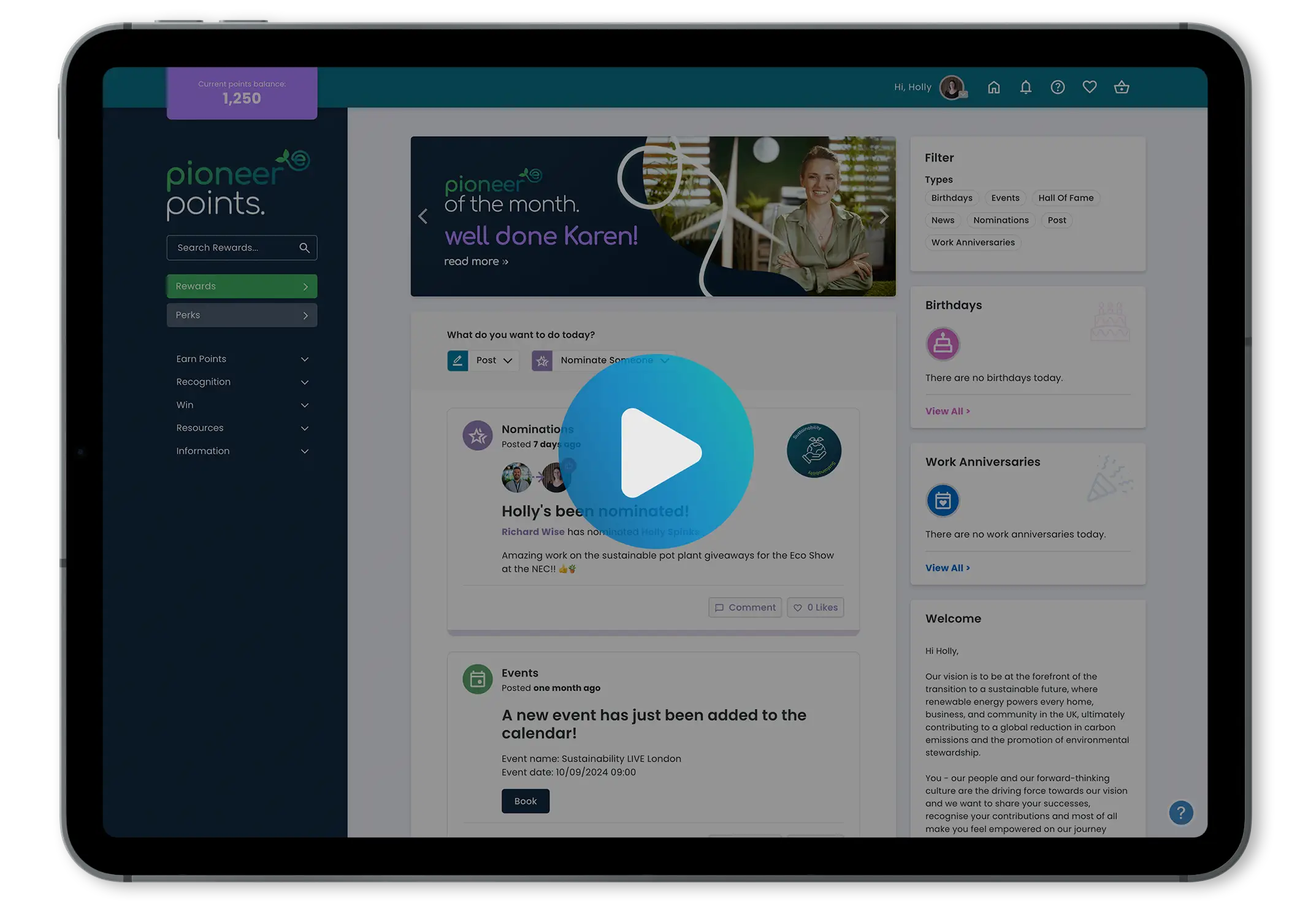


To motivate a sales team you need to create a dynamic environment where each of your colleagues feels empowered to sell to the best of their ability, valued for their contribution and aligned with the collective goals of the organisation.
An enthusiastic and knowledgeable sales team can be the driving force that ensures you surpass stretching targets and propel the company forward.
In this blog, we’ll dive into some common questions sales leaders have about motivating their team. Then we’ll provide practical sales motivation strategies to spark passion, boost morale and unleash the full potential of ALL the sales pros in your own team.
Skip to:
So, why do we need motivated sales teams?
Sales pros are on the frontline, forging connections with customers and driving revenue. So maintaining a consistently high level of motivation among sales teams is crucial for several reasons:
- Drive performance: Motivated sales teams are more likely to go above and beyond to achieve their targets. When team members are inspired and enthusiastic about their work, they are willing to put in the extra effort to excel, leading to improved performance and increased productivity.
- Boost morale: Sales can be a challenging and demanding field, with frequent rejection and setbacks. Motivational boosts help to bolster morale, keeping spirits high even during tough periods. A positive and motivated team is better equipped to bounce back and maintain momentum, fostering a resilient work culture.
- Enhance customer experience: Motivated sales teams are more attentive to customer needs. They are driven by a genuine desire to help customers solve their problems and fulfil their needs. In turn, this builds stronger relationships with customers, driving repeat business and referrals.
- Attract and retain talent: A motivated work environment, characterised by recognition, rewards and opportunities for growth, acts as a magnet for top performers and increases employee retention rates.

The most common challenges with sales motivation
Motivating a sales team is a task that demands keen insight, strategic planning and unwavering dedication on the part of leaders. Yet, it’s no secret that it’s often easier said than done. There are myriad reasons why igniting and sustaining motivation within a sales team can be particularly challenging, including:
 Periods of low performance
Periods of low performance
Maintaining morale and motivation when sales are slow, or targets are not being met can be challenging. With this in mind, it’s essential to keep team spirit high and encourage perseverance through these tough times.
 Objections to sales targets
Objections to sales targets
Sales teams may push back against targets they perceive as unattainable. Overcoming these objections requires effective communication, a clear demonstration of the rationale behind the strategies and providing support and resources needed to help achieve the targets.
 Burnout and fatigue
Burnout and fatigue
Sales roles are notorious for their demanding nature, often resulting in burnout among team members. The pressure to meet high sales targets coupled with the fast-paced nature of the job can quickly lead to exhaustion. To combat burnout and maintain motivation levels, it’s crucial for sales teams to prioritise self-care. This might include encouraging regular breaks, promoting work-life balance, providing resources for stress management and fostering a supportive team culture.
 Fluctuating market conditions
Fluctuating market conditions
Fluctuating market conditions can pose significant challenges for sales teams, impacting their ability to meet targets and maintain motivation. These can be caused by changes in consumer demand, shifts in industry trends, economic instability or even unexpected events like global pandemics! This can lead to unpredictability in sales forecasts. Your team may find it difficult to anticipate customer needs or preferences accurately, leading to uncertainty and hesitancy in their sales strategies.
In such uncertain environments, sales leaders must adopt a flexible approach to motivate their teams. This may involve regularly monitoring market trends and customer feedback, providing updated training and resources to address changing market dynamics and encouraging creativity and innovation in sales tactics.
With this in mind, you might be keen on mastering how to effectively motivate your sales team, especially when faced with unexpected and turbulent circumstances. Here is a short video covering some top tips:
What is the best motivator for a sales team?
Finding the perfect motivator for a sales team isn’t a one-size-fits-all deal.
Determining the most effective motivator(s) involves understanding the unique composition of the team, the organisational culture and the nature of the sales role itself.
While individual preferences vary, several key motivators consistently stand out in driving performance and engagement within sales teams:
- Recognition: Sales professionals thrive on acknowledgement for their hard work and achievements. Whether it’s a public shout-out during team meetings, personalised notes from management or inclusion in company-wide newsletters, recognition fosters a sense of pride in their contributions.
- Financial Incentives: These incentives come in various forms, such as bonuses, commissions and performance-based rewards, designed to incentivise specific behaviours. By linking compensation directly to performance metrics like sales volume, revenue targets or customer acquisition, companies create a clear pathway for sales professionals to see the direct impact of their efforts on their earnings.
- Clear goals: Providing sales team members with clear, attainable goals helps them stay focused. When goals are well-defined and aligned with the organisation’s objectives, sales professionals can track their progress and see the tangible impact of their efforts.
- Professional development opportunities: Sales professionals are often driven by opportunities for growth and advancement in their careers. Providing access to training programmes, mentorship opportunities and skill development workshops not only enhances their capabilities but also demonstrates the organisation’s investment in their long-term success.
- Positive work environment: Cultivating a supportive and collaborative work environment plays a crucial role in motivating sales teams. A culture that values open communication, teamwork and mutual respect fosters a sense of belonging and camaraderie, which ensures sales professionals perform at their best.
How do you motivate a demotivated sales team?
Historically, salespeople have often enjoyed generous compensation packages, and when it comes to motivating sales teams, financial incentives emerge as a clear winner.
Points might be redeemable for flights, hotel stays, upgrades or even experiences like concert tickets or dining vouchers. The value of points in these programs can vary based on factors such as the destination, availability and demand.
According to PayScale, 51% of sales professionals stated that earning potential had a major influence on their job satisfaction.
In sales, compensation differs from traditional fixed salaries as it’s directly tied to the volume and value of closed deals. Put simply, the more sales a salesperson achieves, the greater their earnings. This principle extends to incentive packages as well, where sales professionals are rewarded for their performance with enticing benefits and rewards.
With this in mind, here are some of the best options to motivate a demotivated sales team:
 Attractive commissions
Attractive commissions
Commissions serve as a powerful motivator for sales teams by offering a percentage of the sales revenue as a reward for closing deals and driving revenue. This direct link between effort and reward provides salespeople with a clear incentive to maximise their sales efforts and contribute to the company’s bottom line.
As sales professionals see their hard work directly translate into increased earnings, they are motivated to pursue opportunities and negotiate deals more effectively. Commissions can be structured in various ways, such as tiered commission rates based on sales volume or bonuses for exceeding sales targets.
 Profit sharing
Profit sharing
Profit sharing is a compensation arrangement where a portion of a company’s profits or revenue is distributed to employees as an incentive or reward for their contributions to the organisation’s success.
One of the key benefits of profit sharing is that it provides employees with a direct stake in the financial performance of the company. By sharing in the financial rewards of the company’s success, employees are motivated to work towards achieving common objectives and driving overall profitability. This creates a sense of ownership and accountability, as they recognise that their efforts directly impact the company’s bottom line.
Profit sharing can take various forms, including cash bonuses and stock options and the programme typically varies depending on the organisation’s goals, industry and culture.
Employers must establish clear criteria for eligibility and allocation, as well as communicate the programme’s objectives and benefits to employees in a transparent manner. Regular performance evaluations and adjustments may be necessary to ensure that the profit-sharing programmes remains aligned with the organisation’s goals and objectives.
 Incentives
Incentives
Incentives are essential components of any successful organisation’s strategy for motivating and rewarding employees. These programmes provide tangible rewards or benefits in exchange for achieving specific goals or desired behaviours. However, it’s all about choosing the right incentive plan for your team.
Offering rewards for outstanding performance for example, reinforces positive behaviours, where employees feel valued and appreciated for their contributions, which in turn, encourages them to become more engaged in their work.
When incentive programmes are meticulously designed, they serve as catalysts not only for healthy competition but also for bringing a sense of fun into the workplace. These well-structured initiatives not only encourage individuals to strive for excellence but also foster a supportive environment where team members motivate each other to succeed. This dynamic encourages employees to push their boundaries, which in turn, leads to greater job satisfaction.
How to motivate a sales team without money
While monetary rewards are undoubtedly effective motivators as mentioned above, there are numerous non-monetary strategies that can inspire and energise sales professionals to excel in their roles, such as celebrating their achievements, offering flexible work opportunities and even career progression.
Let’s explore some of the most impactful sales motivators that extend beyond monetary rewards:
 Celebrate successes
Celebrate successes
When you forget to celebrate successes, you’re missing out on a chance to lift your team’s spirits.
Recognising achievements, whether big or small, ensures everyone feels appreciated. Without those pats on the back, team members might start to wonder if their efforts even matter. And who wants to work hard when it feels like no one notices? Ultimately, it’s about showing your team that you see their hard work and you’re proud of them. So, don’t forget to give them a shout-out or maybe even a little reward now and then.

 Find solutions to team problems
Find solutions to team problems
When your team is in a slump, you may be wondering about how to turn things around.
However, micromanaging isn’t the answer.
Instead, why not embrace a more collaborative, team-centered approach?
Schedule a brainstorming session where everyone’s ideas are welcome. Your team members are the real experts, the ones who live and breathe the job day in and day out. So, it’s only fair to give them the floor. Encourage them to air their grievances and share their vision for improvement. After all, they’re the ones slogging it out and facing the challenges head-on. By empowering them to have a say and contribute their insights, you’re sending a powerful message: their opinions matter and their voices are heard.
Together, you just might uncover some game-changing solutions to revamp your lead generation strategies, bolster teamwork dynamics and supercharge those sales figures.
 Get to know your sales team
Get to know your sales team
Understanding your sales team on a personal level means diving into what makes each member tick—their passions, quirks and ultimately, what drives them to succeed.
It’s about recognising that behind every sales target is a unique individual with their own set of strengths, weaknesses and preferred ways of communicating.
By taking the time to connect with each team member, you can tailor your leadership approach to provide the support and guidance they need to thrive.
It’s not always straightforward to determine what motivates each individual, but you but you can kick start the process with a few straightforward questions:
- What aspects of your job do you find most fulfilling?
- What professional goals are you working towards?
- How do you prefer to receive feedback and recognition for your achievements?
- Are there any challenges you’re facing you’d like support with?
- What incentives or rewards would inspire you to go above and beyond in your role?
 Set reasonable goals
Set reasonable goals
While closing deals is undoubtedly important, putting too much emphasis on this single metric can sometimes make team members feel overwhelmed or undervalued. To provide a more balanced perspective, consider incorporating a variety of customer-focused metrics into your assessment process, such as:
- Response times (How effectively your team is engaging with potential customers)
- Customer satisfaction (How well your team is meeting the needs of clients)
- Stage-by-stage conversion rates (Pinpoint where in sales your team needs to fine-tune their strategy)
These metrics give you a more comprehensive picture of your team’s performance and highlight areas where they’re excelling or might need some extra support.

 Career progression
Career progression
Career progression is a major driving force in sales and it’s easy to see why.
Firstly, it offers sales professionals a clear path to progress and grow, rewarding them for their dedication and hard work with tangible benefits like promotions and increased responsibilities. This understanding that their efforts can lead to higher earnings and greater opportunities pushes individuals to consistently bring their A-game.
It also gives salespeople a sense of ownership over their career paths, encouraging them to set ambitious goals and actively seek out avenues for advancement. Plus, with career advancement being merit-based, individuals are encouraged to acquire new skills and stay ahead of market trends.
Witnessing colleagues succeed through hard work and creativity inspires others to strive for excellence and creates a supportive environment where everyone pushes each other to reach new heights.
 Flexible work arrangements
Flexible work arrangements
Research consistently shows that when employees have control over their work schedules, they tend to be more focused and motivated, ultimately leading to higher levels of productivity and performance.
By allowing for remote work opportunities, you liberate your team from the confines of the traditional office setup, enabling them to work from locations that best suit their needs and preferences – whether it’s the cosiness of home, the buzz of a co-working space or even their favourite coffee shop.
Similarly, providing flexible hours empowers your team to tailor their work schedules around their personal lives. Whether they need to juggle childcare responsibilities, attend personal appointments or align their work hours with their most productive times, flexible hours grant them the autonomy to do so.
By embracing flexible working, you’re demonstrating a profound trust in your team’s ability to manage their time and responsibilities effectively. This trust breeds a sense of empowerment and ownership over their work, which naturally translates into heightened motivation and engagement.
 More breaks throughout the day
More breaks throughout the day
Taking breaks is about giving your sales team a chance to recharge and come back refreshed, which ultimately leads to happier employees and better performance all around.
When you encourage your team to take more breaks, you’re giving them the opportunity to step away from their desks and engage in activities that help them relax and reset. Whether it’s going for a quick walk, grabbing a healthy snack or simply practising mindfulness for a few minutes, these little breaks can work wonders in reducing stress, boosting energy levels and sharpening focus.
What’s more, research has shown that taking short breaks can improve concentration and cognitive function, leading to better decision-making and problem-solving skills in the long run.
Empower your sales team to achieve success
Our comprehensive sales motivation toolkit equips you with everything needed to inspire your team to achieve their goals. Whether your strategy involves commission-based incentives, performance-based rewards or recognition programmes, Incentivesmart offers customisable performance-boosting solutions tailored to suit your company’s needs.
Let us partner with you to unlock the full potential of your sales team and drive unprecedented results!








